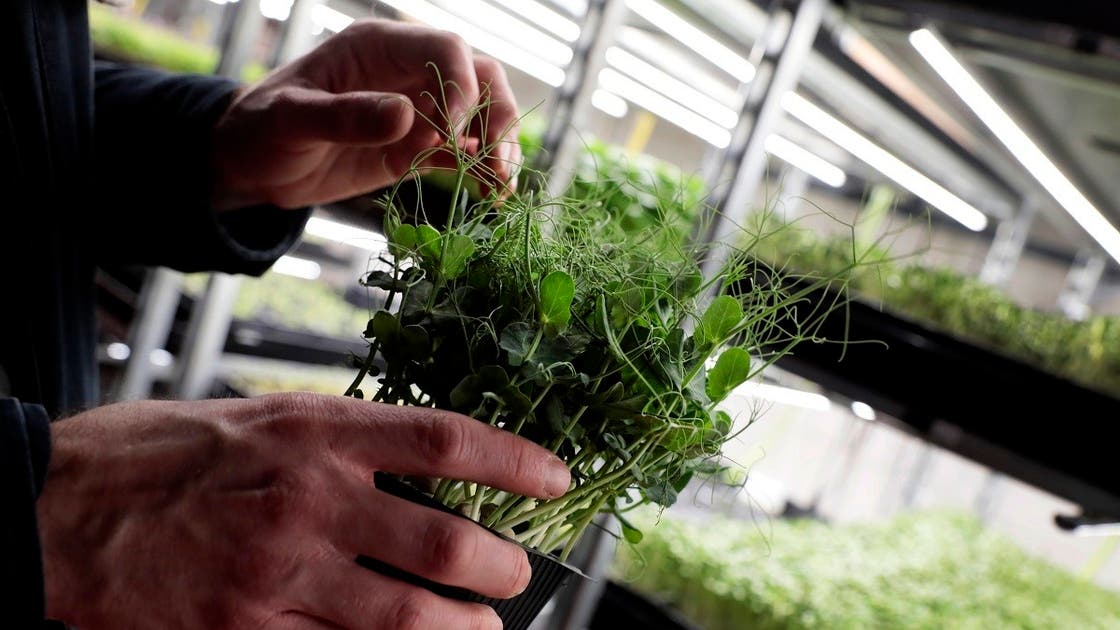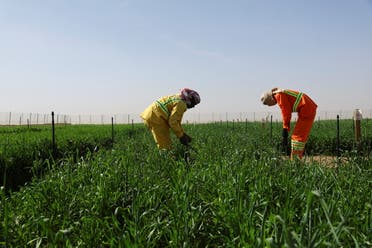Vertical farming, agri-tech key to bolstering UAE’s food, water security: Ministers

Ministers in the United Arab Emirates have stressed the need for innovative agri-tech, such as vertical farming, to ensure long-term food security and self-sufficiency in the Arab world.
Speaking to Al Arabiya English on the sidelines of the fourth Global Vertical Farming Show in Dubai, Mohammed Mousa Almeeri, undersecretary of the Food Diversity Sector at the UAE’s Ministry of Climate Change and Environment, said investing in innovative solutions was critical to the UAE’s ambitions to reduce reliance on overseas food imports and to provide for the needs of its growing population.
“Agri-tech is very important to compete with all the overseas challenges we are facing. We are not in an ideal agricultural area,” he said. “We are in an arid area and in the middle of the desert. This impacts production and our resources. So, we have to utilize all types of agriculture and utilize the concept of sustainable agriculture to preserve our natural resources.”
This, he said, can only be done through innovation, pointing to the UAE’s many initiatives to advance agri-tech across the emirates.
At the conference, Almeeri addressed the advancements in agriculture and steps needed to enhance food security in the Middle East while underscoring the need to cover the deficit in basic food commodities in the Arab world.
He said – in line with the UAE’s Year of Sustainability, which will culminate in the staging of COP28 in Dubai this year - the UAE is committed to inspiring collective global action to seek sustainable and long-term food security for the region.
People work at a wheat farm, where a newly launched 400-hectares farm in Sharjah's Mleiha, which has turned a UAE desert into a green land, aims to further expand and reduce imports, in Mleiha area, Sharjah, United Arab Emirates, February 8, 2023. (Reuters)
“As we know, we are located in a desert region with some of the highest temperatures in the world,” he said. “And let us not forget we are a water-scarce country with less than five per cent of arid land.”
However, he said, what sets the UAE apart is its ability to invest and innovate to find long-term solutions for protecting its people.
Vertical farming, an innovative agri-tech with a significantly smaller carbon footprint than traditional agriculture, is one way the UAE invests in long-term and sustainable food security.
Plants are grown in fully controlled environments – where tech monitors temperature, humidity, lighting, and water – and plants are developed using mineral nutrient solutions in water without needing soil.
Last year, the world’s largest vertical plant farm opened in Dubai’s Al Maktoum International Airport – a $40 million joint venture between Emirates and US-based Crop One. The mega facility – spread across a 330,000-square-foot facility named Bustanica – has the capacity to grow more than a million plants each year.
It contributes toward the Gulf state’s 2018 pledge to secure food with initiatives including diversification of food sources.
It aims to make the UAE “the world’s best in the Global Food Security Index by 2051 and among the top 10 countries by 2021,” according to information shared on the UAE government website.
The country ranked 23 in the 2022 report, a marked improvement in score compared to previously published data.
Almeeri said investing in agri-tech is more critical than ever.
“We are now faced with different challenges, and with the increasing population demand and the globalization of our country, it is now up to us to build on the achievements of our forefathers and utilize the strong foundations not only to meet the needs of today but also to prepare a prosperous future for the next generation,” he said.
Almeeri pointed out that 85 percent of consumed food products in the emirates are imported - due, in large part, to the massive population surge across the country.
The UAE, said Almeeri, has heavily invested in technologies including vertical farming, hydroponic farming, controlled environment smart greenhouses and sustainable farming practices.
“These solutions help us address the critical water-food-energy nexus,” he said. “Recognizing the continuously evolving challenges in the global food system is a key step to achieving food security.”
Mohammed bin Obaid al-Mazrooei, president of the Arab Authority for Agricultural Investment Development (AAAID), said that, through the AAAID, more than $661 million has been plowed into investment in more than 50 companies and projects across 22 member states to increase sustainable agriculture and contribute to food security across the Arab world.
But, he said, more innovation is needed.

Sultan Khamis al-Waheebi, Investment Division Director, Abu Dhabi Agricultural and Food Safety Authority (ADAFSA), pointed out that the UAE relies too heavily on food exports.
“There is a significant gap between what we consume and import. We cannot reach self-sufficiency without partnerships with the private sector.”
He pointed out that, in Abu Dhabi alone, there are more than 24,000 fruit and vegetable farms and 24,000 animal production farms.
Most, he said, are still run using traditional agricultural practices.
“This is why we are not reaching self-sufficiency,” he said. “Without adopting high-tech technology, we cannot reach the aims of Abu Dhabi and the UAE. We have a lot of farms in Abu Dhabi – but most of them are using the traditional way of agriculture; how do we transform them? Those farms are ready for the infrastructure. But they need the companies to converge them from traditional to another way – such as vertical farming.”
Jamie Burrows, founder and CEO of Vertical Future, said the world is witnessing a “third generation of modern vertical farming,” which has witnessed many positives and negatives over the past decade.
“We really need to be looking at the new innovation that needs to take place,” he said.
The past 12 months have seen volatility in capital markets, rising interest rates and a “lack of faith” in the vertical farming market “driven by some failures in the US and other markets, which have really raised a lot of questions about where we go next.”
Venture tech finances into vertical farming technologies have been “rushed and brought together in the wrong way and with the wrong hands,” said Burrows – a challenge that has plagued the industry. He said capital investment is needed in a more measured way.
He highlighted the UAE as a place with both the demand for agri-tech and a country ideal for investment.
“We really think this is the place for everything that needs to happen to be done,” he said. “There needs to be faith in the sector. We need to recognize disruptive, integrated and intelligent solutions. And the UAE has always been known globally as a place with a curiosity to innovate and has become a beacon of hope for change.”
Jerome Auchere, senior director at the World Green Economy Organization, said vertical farming is vital in safeguarding a future with food security.
“Climate change is here. Whether it is melting ice caps or warmer oceans – we can all see around us some signs of climate change.”
“There is an urgent need to combat climate change and a greener economy is part of that solution.”
Vertical farming is critical to a greener economy, he said, adding that the global vertical farming market is expected to reach $20 billion by 2025.
“Vertical farming addresses several elements that can contribute to a more sustainable future, whether it be resource efficiency – for example reducing land usage – environmental conservation, and climate resilience. It reduces the use of pesticides. It also fosters better health and nutrition and provides local food production in remote areas. And it also fosters innovation and technology and promotes education and awareness among the population.”
“And so, vertical farming indirectly ticks on the boxes on the United Nation’s Sustainable Development Goals (SDGs).”


